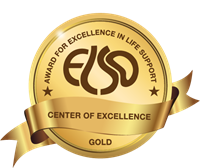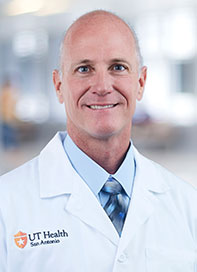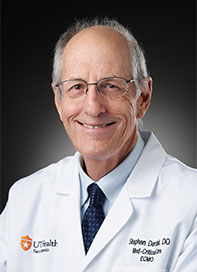What Is ECMO?
Extracorporeal Membrane Oxygenation (ECMO) temporarily supports severe heart and/or lung failure that does not respond to regular treatment. ECMO uses equipment that is similar to the machines used for cardiac bypass surgery in the operating room.
Two types of ECMO
- Venoarterial (VA) ECMO – Uses a vein and an artery
- Venovenous (VV) ECMO – Uses one or two veins
The ECMO machine has several parts including:
- A pump to move blood through the tubing
- An artificial lung (oxygenator) to remove carbon dioxide and add oxygen
- A blood warmer
- A monitoring device to ensure safe operation of the system
ELSO Gold Level Award of Excellence in Life Support
Since 2020, University Health has been a designated Gold Level Extracorporeal Life Support Organization (ELSO) Center of Excellence.
The ELSO Award recognizes programs worldwide that distinguish themselves by having processes, procedures and systems in place the promote excellence and exceptional care.
University Health’s ECMO program achieved the highest level of performance in three categories:
- Promoting the mission, activities and vision of ELSO
- Using the highest evidence-based quality measures, processes and structures
- Training, educating, collaborating and communicating ELSO guidelines that contribute to a healing environment for families, patients and staff
Why Do Patients Need ECMO?
Many diseases can cause a patient’s heart and/or lungs to fail. The usual treatments for most of these problems include:
- The use of a breathing machine (ventilator) to deliver oxygen
- Medications to help open the lungs or relax the blood vessels between the heart and lungs
- Medications to support the circulation
In some cases, the heart or lungs are too sick to respond to these therapies. That is where temporary heart ECMO support can help.
The goal of ECMO is to provide temporary life support while the underlying heart and/or lung disease undergoes specific treatments with hope of recovery.
If it is not likely that a patient will recover while on ECMO, they are assessed for a more long-term treatment such as lung transplant or mechanical heart-assist devices. If the patient is not a candidate for these options, heart ECMO support is transitioned to palliative care.
Conditions ECMO Can Support
Conditions common to patients of all ages that can be supported with ECMO include:
- Acute respiratory distress syndrome (ARDS)
- Severe pneumonias (e.g. COVID-19)
- Status asthmaticus
- Myocarditis
- Severe heart failure following cardiac surgery
- Blood clots to the lung causing severe shock
- Severe chronic heart failure while waiting for a durable heart mechanical assist device or heart transplant
Diseases specific to infants and children that can be supported with ECMO include:
- Meconium aspiration syndrome
- Persistent pulmonary hypertension (PPHN)
- Congenital diaphragmatic hernia (CDH)
Diseases specific to adults that can be supported with ECMO include:
- Acute heart failure (e.g. associated with heart attack, myocarditis)
- Severe chronic lung failure while waiting for lung transplant
Who Is on the ECMO Team?
The ECMO team is made up of many different specialists who work together to provide the best possible care for patients who need ECMO support.
Highly skilled nurses, respiratory therapists, physical therapists and social workers are always involved in patient care. The following team members will be available 24 hours a day to care for patients on ECMO.
- ECMO intensivist – a specially trained physician who will consult with the ICU physician about the special needs of the ECMO machine and patients who need this type of life support. The ECMO intensivist will oversee care for the entire time the patient is on ECMO.
- Cardiothoracic surgeon, vascular surgeon, cardiologist – A cardiothoracic surgeon, vascular surgeon, cardiologist, or ECMO intensivist may be responsible for placing the large cannulas (similar to a large IV) that are used to drain the patient’s blood into the ECMO machine and then return it back to the patient. The surgeon, cardiologist or ECMO intensivist will evaluate the cannulas and ECMO components every day, as well as be available for any other issues that may arise.
- ECMO specialist – The ECMO specialist is a nurse or respiratory therapist who has gone through extensive training in order to manage the ECMO machine. There will be an ECMO specialist at the patient’s bedside 24 hours a day to monitor the ECMO machine components and follow the necessary laboratory results.
- Advanced technology specialist – Advanced Technology Specialists (ATS’s) are ECMO specialists who are also responsible for the set-up and advanced troubleshooting of the ECMO machine. They are also able to set up additional therapies such as continuous renal replacement therapy (CRRT) if needed.
- Respiratory therapist - Patients on ECMO are treated with very gentle ventilator settings to allow the lungs time to heal. Respiratory therapists work closely with ECMO specialists to ensure appropriate ventilator settings are used and provide specialized therapies to assist with clearing secretions from the lungs. Patients are closely monitored for signs of lung recovery to allow safe transition off ECMO to conventional respiratory support.
- Physical therapist - Patients on ECMO are encouraged to participate in physical therapy as soon as possible. This may include sitting up in bed, standing and even walking with close monitoring by the physical therapist and ECMO team. The goal is to have an awake, calm patient who can participate in physical therapy to avoid the deconditioning often associated with critical illness.
Early reduction of sedation and sometimes removal of the breathing tube and ventilator while on ECMO can facilitate patient rehabilitation and recovery.
Recovery from ECMO
Achieving optimal functional recovery and returning to a robust quality of life following ECMO and critical illness is a long process that continues beyond the ICU and requires coordination among many providers. The University Health Cardiovascular Center is a unique resource that strives to provide the multi-disciplinary expertise to achieve this goal.
Post-discharge planning and outpatient care for ECMO patients is facilitated by our ECMO and medical providers. We will contact each patient’s primary care provider to assure they receive important information to assist with each patient’s ongoing care once discharged.


